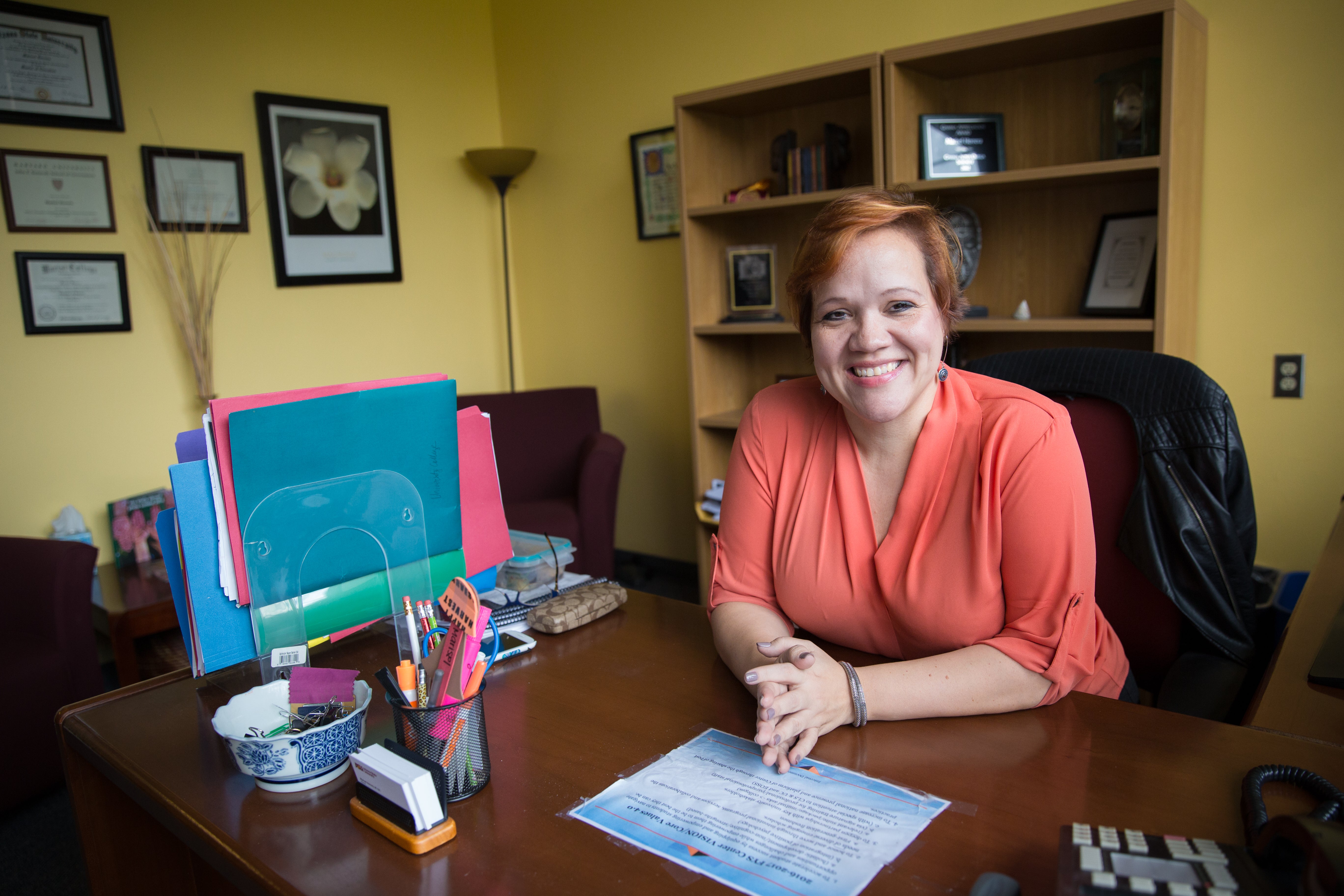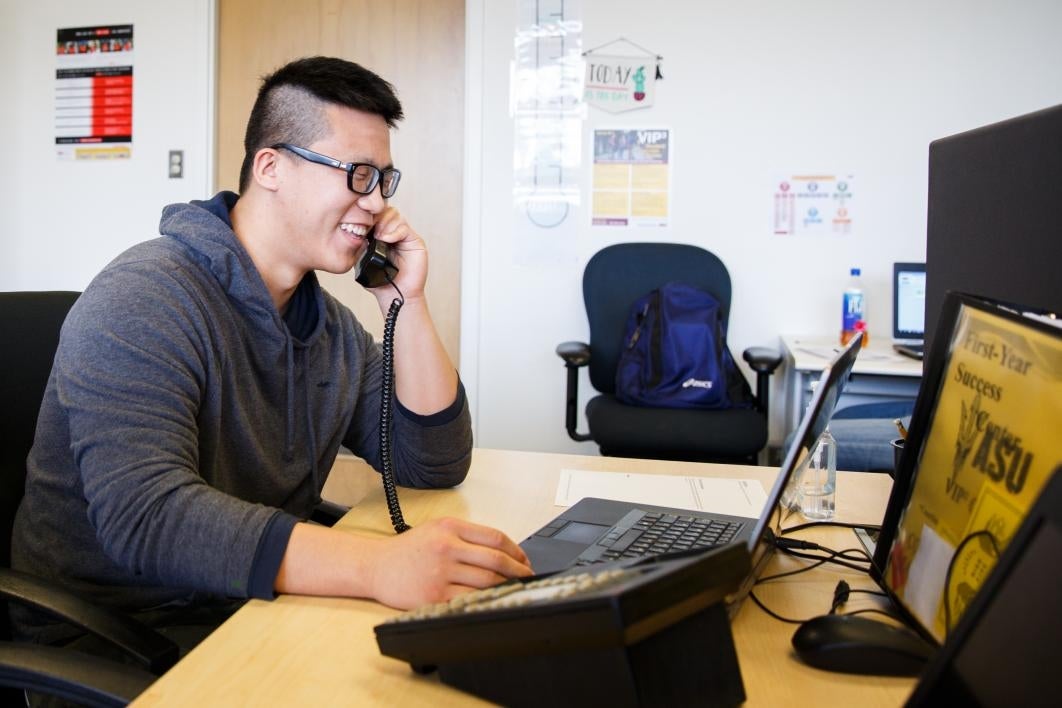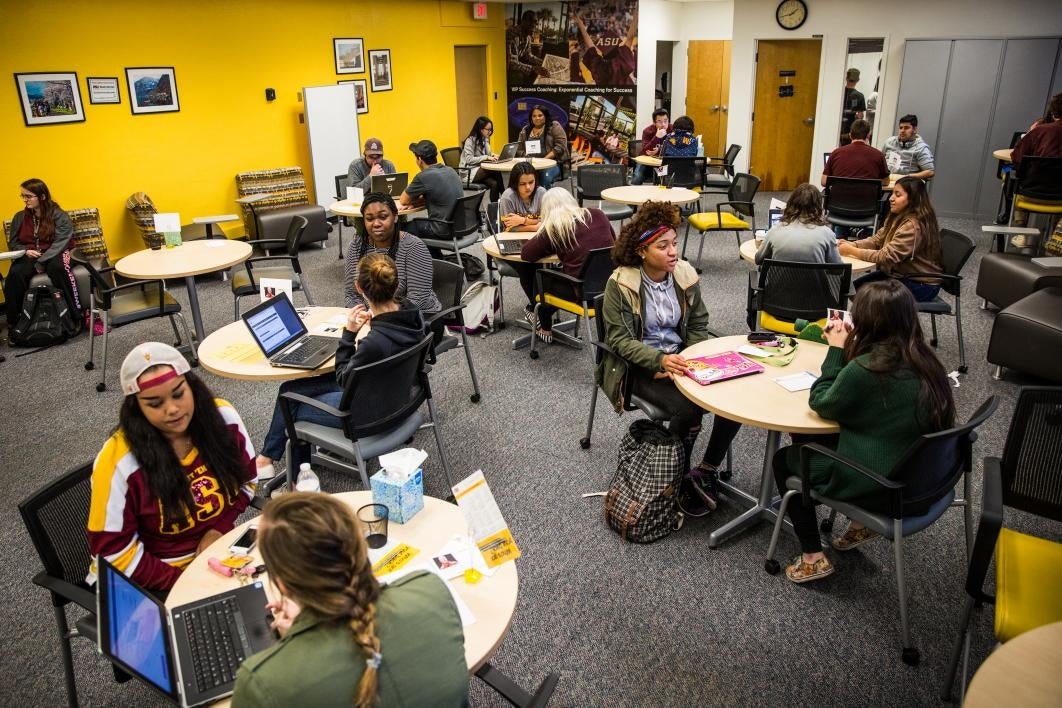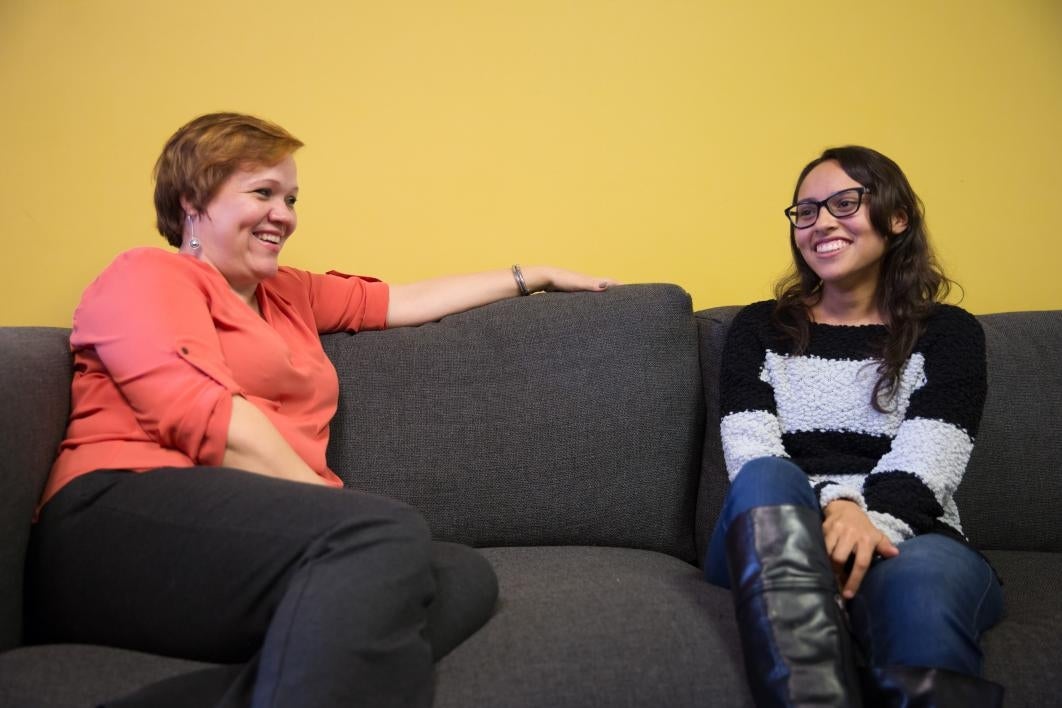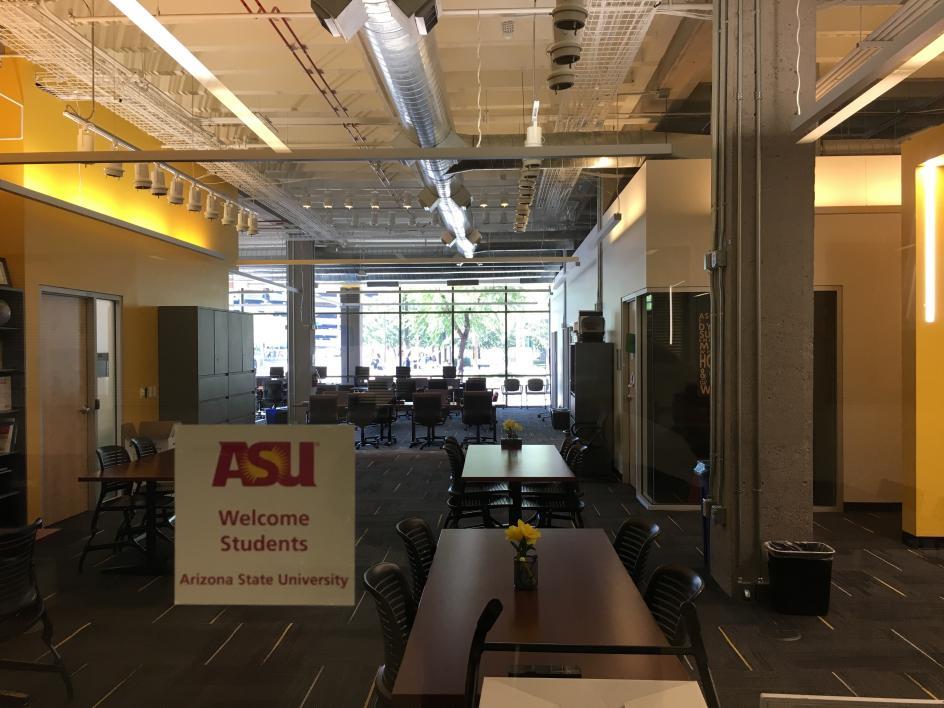Peer coaching at ASU: GPS for reaching goals, accelerating success

ASU junior Rachel Walker, right, a Global Politics and Supply Chain Management major, works with freshman Janisse Rivera, a Business Sports and Media major, in the First-Year Success Center's Tempe campus location, in Interdisciplinary B building. Walker has been working with Rivera since the beginning of this year. Photo by Anya Magnuson/ASU Now
Has the new year put you in a goal-setting mood?
“Pick two and focus on them,” that’s the advice that ASU First-Year Success Center associate director Kevin Correa has for students — or anyone — motivated to use the start of the new year and a new semester as an opportunity to develop some new positive habits.
“And if you’re an ASU freshman or sophomore,” Correa added, “making a habit to connect with your personal coach in the First-Year Success Center would be a great place to begin!”
The center, launched in October 2012 and part of University College, has been helping ASU freshmen and sophomores dream big and accomplish their goals with personalized peer-coaching – supporting more than 21,000 students in 50,000 coaching appointents, to date.
“Our focus,” said center founding director Marisel Herrera, “is easing their transition to university life and developing the skills and connections that will help them persist to graduation — and thrive along the way.
“If you look at celebrities, corporate leaders, athletes,” said Herrera, “they often employ personal coaches. They know the value of working with someone who is further along than they are, who has specific knowledge about how to successfully get to where they want to go.”
At ASU, coaching visits are free, entirely optional and students set the agenda.
“Students aren’t forced to come because they’re on probation or anything like that,” she said. “We’re serving students who have a broad range of GPAs, from those struggling to those academically thriving.”
During the fall 2016 semester, 3,944 ASU students were served in 8,488 coaching appointments — in-person and via email, phone, and Skype. The center reached out to more than 9,000 freshmen and sophomores with personalized invitations, encouraging them to take advantage of the free personal coaching.
Rachel Walker, an ASU junior from Pennsylvania who now works in the center as a coach, remembers what it felt like to be a freshman hesitant to come in for an appointment.
“My coach, Kasey, had reached out to me a few times, but I wasn’t entirely sure how I felt about the whole concept of a success coach,” said Walker. “I was doing great in school and I didn’t think that I needed any kind of help.”
The global politics and supply chain management major said it was the lure of extra-credit points in WPC 101 that finally got her to visit the center.
“I had never written down any goals for myself really, and never had a clear picture of what I wanted to accomplish; I just wanted to pass,” she said. “Kasey sat down with me and helped me see the importance of goals and to be more confident in my ability to achieve more than expected.
“I added my supply chain management degree because Kasey showed me how well it fit with my dream of work that would let me travel the world,” observed Walker, who plans to move to Australia and join a global company.
Correa, who shares supervision of the center’s 75 coaches and works to develop programming and curriculum, said that Walker’s experience isn’t atypical.
“Many students come in a little reluctantly, but they quickly feel a comfortable connection and are surprised by how many ways their coach can help,” he said. “They’re glad to suddenly have this other person in their corner who can help them accelerate their success.
“Sometimes students want to talk about how to do better academically or to get help with motivation and accountability,” Correa explained. “Sometimes students are doing well in classes but want to find ways to get involved on campus or in the community. Sometimes they need help to get in touch with other resources to solve an immediate problem or they want to focus on some specific goals like being well or managing their money.”
“It’s more than just meeting to talk about resources, or tips and tricks to handle your first college years,” added Walker. “It’s a place to be honest about college and to really help you see what you are capable of accomplishing.”
The right person at the right time can change a life
That’s the attitude that underpins all that ASU’s First-Year Success Center does, from its approach to success coaching to the red-carpet treatment it tries to give every visitor who walks in the door.
“The model is simple but powerful,” said Herrera. “Emply and equip a highly trained cadre of near-peers who have done well at ASU to guide and mentor freshmen and sophomores who are navigating their adjustment to college. Give everyone you serve the VIP treatment. And always work from a position focused on a person’s strengths and purpose, not deficits.”
Student coaches receive about 100 hours of training over an academic year while employed in the center.
“In the fall semester, we integrated positive psychology constructs more deeply into our coaching curriculum,” Herrera continued, “and we shared relevant positive psychology messages with students in our programming and monthly e-newsletters.”
Why the emphasis on positive psychology?
According to Herrera, “The marriage of positive psychology with higher education best practices is a cutting-edge approach and highly impactful. It’s about teaching resiliency,” she said. “Life doesn’t always unfold the way we expect it to. When stuff happens, what often trips students up — and what determines how well they cope — are mindset barriers and heat-of-the-moment emotioinal reactions. For instance, when you have a trigger in your environment, that leads to an internal thought and then to a reaction. We can learn to manage a lot of that process.”
Training also addresses how to be a ‘first-level responder’ when a student is in crisis.
“Because students don’t have to impression-manage with peer coaches as they would with an older adult,” Herrera noted, “sometimes a coach is the first person a student will tell about a difficult situation. We want to take care of our coaches and make sure they’re aware of the protocols and resources to get students expedited help.”
First-Year Success coaches are juniors, seniors and graduate students who have at least a 3.0 GPA and who have been engaged on- or off-campus.
“We also look for cultural competency and even resiliency — maybe someone didn’t have a strong first year but turned it around,” said Herrera.
Last year the center received 500 applications for its open coaching spots.
“We now have coaches who were coached by us,” she said, “who want to pay it forward and change the ASU experience for someone else.”
Dongnan “Jacky” Shao, a senior from China who is now in his second year working in the First-Year Success Center, said he leaned on his coach as a freshman to help him get familiar with ASU, to improve his English, and to get more involved on campus.
Shao recognizes he’s grown in many ways being a coach.
“I’ve definitely developed more patience and have become more observant in life. I’ve learned to really listen to people, to understand their questions and find the best way to address their problems,” said the entrepreneurship and supply chain management major. “Every training we took was very helpful, but I found the support from the whole team, from both supervisors and peers, is what helped me the best. The whole working environment is just awesome.”
Former success coach Ana Licona, who went on to join the leadership development team in the Office of Presidential Personnel in the Obama White House after graduating, counts her time as a First-Year Success coach as “one of the most rewarding experiences ever!
“The most memorable moments for me were when my students accomplished their personal and professional goals, succeeded in their classes, studied abroad, received scholarships, and got involved with a club or organization,” said Licona, who earned bachelor’s degrees in sociology and global studies and a certificate in political entrepreneurship. “I was able to follow my students' dreams and dream alongside them. I loved being their cheerleader!”
Success by the numbers
Qualitative feedback from coached students consistently puts the First-Year Success Center among the top-five ASU units in satisfaction surveys.
An impressive 98 percent of coached students in fall 2016 reported their coach helps them achieve their goals and gave them a boost of confidence; 99 percent reported they can go to their coach for advice and that their coach understands them.
“Because getting students through to graduation is ultimately our goal, we’re especially pleased that retention numbers show that for freshmen who received coaching in 2015-2016 there was a 10 percentage point difference in retention overall,” Herrera noted. "There was a 14 percentage point difference for ethnic minority students who were coached.”
In the fall, center staff expanded the VIP Suite programming for sophomores and developed targeted web resources and programs aimed at first-generation students and out-of-state students, two populations that may face additional barriers to success. Some ASU colleges have also begun partnering to embed First-Year Success coaching into their introductory courses and in residential communities.
The word is getting out in higher education, Herrera said. First-Year Success Center staff are regularly approached by other units and universities nationwide to share their coaching and retention framework.
In February, center leadership will present the ASU model at the 36th annual Conference on the First-Year Experience, in Atlanta, where Herrera (pictured below) will be one of 10 individuals recognized with the Outstanding First-Year Student Advocates award at the conference’s opening session.
The award honors those doing exceptional work in student learning, development and success nationally. It’s co-sponsored by the National Resource Center for the First-Year Experience and Students in Transition, and Cengage Learning.
Marisel Herrera, the founding director of ASU's First-Year Success Center, is one of 10 individuals being honored in February with the Outstanding First-Year Student Advocates award, at the 36th annual Conference on the First-Year Experience. Photo by Anya Magnuson/ASU Now
“This distinction is incredibly well deserved,” observed University College dean Duane Roen. “At ASU Marisel has been a recognized innovator and has made a difference for thousands of students in her work in academic and student affairs over the last 20 years.”
Herrera, who earned a master’s in education at ASU and is pursuing doctoral studies in educational leadership, has also done advanced coach training and certifications from the Certified Coach Federation and the Coaching & Positive Psychology Institute.
She is thrilled that coaching is beginning to be seen as having a natural, organic place in the university.
“When you can get to someone younger in life, they’re still very malleable and open to new ways of thinking,” said Herrera. “Most people are not exposed to this kind of material until they’re well into adulthood and perhaps have gone to counseling,” she added. “But at ASU we’re reaching thousands of students. These coaching techniques are beneficial to all of us, no matter what our age or title.”
To make an appointment with their First-Year Success coach, ASU freshmen and sophomores can call 480-965-3289 or email fys@asu.edu.


